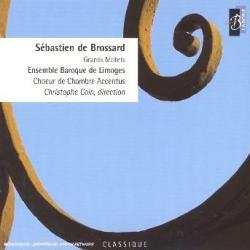Sebastien de Brossard - Grand Motets (1997)
Sebastien de Brossard - Grand Motets (1997)

1. Psalm 125 'In Convertendo Dominus,' grand motet: Preludio 2. Psalm 125 'In Convertendo Dominus,' grand motet: In Convertendo 3. Psalm 125 'In Convertendo Dominus,' grand motet: Tunc Repletum 4. Psalm 125 'In Convertendo Dominus,' grand motet: Tunc Dicent 5. Psalm 125 'In Convertendo Dominus,' grand motet: Magnificavit Dominus 6. Psalm 125 'In Convertendo Dominus,' grand motet: Converte, Domine 7. Psalm 125 'In Convertendo Dominus,' grand motet: Qui Seminant 8. Psalm 125 'In Convertendo Dominus,' grand motet: Euntes Ibant Et Flebant 9. Psalm 125 'In Convertendo Dominus,' grand motet: Venientes Autem 10. Psalm 50 'Miserere Mei, Deus,' grand motet: Simphonie/Miserere Mei, Deus play 11. Psalm 50 'Miserere Mei, Deus,' grand motet: Quoniam Iniquitatem Meam Ego Cognosco 12. Psalm 50 'Miserere Mei, Deus,' grand motet: Cor Mundum Crea In Me, Deus 13. Psalm 50 'Miserere Mei, Deus,' grand motet: Sacrificium Deo Spiritus Contribulatus 14. Canticum Eucharisticum pro Pace, grand motet: Sonata Ad Libitum 15. Canticum Eucharisticum pro Pace, grand motet: Exsurge Gloria Mea 16. Canticum Eucharisticum pro Pace, grand motet: Dicat Nunc Israël play 17. Canticum Eucharisticum pro Pace, grand motet: Dextera Comini Fecit Virtutem 18. Canticum Eucharisticum pro Pace, grand motet: Quomodo Facti Sunt In Desolationem 19. Canticum Eucharisticum pro Pace, grand motet: Audivit Dominus Et Misertus Est. 20. Canticum Eucharisticum pro Pace, grand motet: Revertatur Unusquisque In Domum Suam 21. Canticum Eucharisticum pro Pace, grand motet: Non Levabit Gens Contr Gentem Gladium 22. Canticum Eucharisticum pro Pace, grand motet: Memento, Dominee, David 23. Canticum Eucharisticum pro Pace, grand motet: Et Tu Virtus Fortitudinis Nostræ 24. Canticum Eucharisticum pro Pace, grand motet: Convertimini Filii 25. Canticum Eucharisticum pro Pace, grand motet: Respice In Eos, Domine Performer: Delphine Collot (Soprano), Jean-Paul Fouchécourt (Countertenor), Jérôme Corréas (Bass), Gilles Ragon (Tenor), Olivier Lallouette (Baritone), Catherine Padaut (Soprano) Limoges Baroque Ensemble, Accentus Chamber Choir Christophe Coin – director
If you missed this excellently performed program of Sebastien de Brossard's Grands Motets when it was originally released on Astrée in 1997, waste not a moment acquiring this reissue on the recently-formed Laborie label. While primarily recognized as an ecclesiastic, lexicographer, and bibliophile (his many literary accomplishments include compiling the first French music dictionary as well as authoring the celebrated Catalogue des Livres de Musique), Brossard also was an exceptionally gifted composer--a fact that many observers have unfairly downplayed due to his lack of formal training. To compensate, Brossard instead learned nearly everything from years of voraciously collecting and assimilating musical manuals and treatises from throughout Europe, influences that often give his works a fascinating freewheeling edge.
Brossard displays this unique wherewithal throughout these gorgeous motets. Tutti and solo passages often vary widely--such as in the spectacular "Cor mundum..." of the Miserere. At times he'll introduce German and especially Italian stylistic elements, such as the madrigal-like "Oui Seminant" movement of In Convertendo Dominus. The polyphonic splendour of the broadly paced "Momento, Domine, David" movement of the Canticum Eucharisticum rivals the finest similar efforts by Charpentier, Couperin, LaLande, or any of Brossard's better-known contemporaries. These are only a few of many moments that attest to Brossard's rich and varied expertise.
Laborie's sonics are identical to Astrée's--exceptionally clear yet warmly resonant, and ideal for these works. The original texts and translations are also intact, though unfortunately the type is minuscule and the design makes the English and Spanish especially difficult to read. Regardless, this is a must for all French Baroque vocal/choral music fans and is highly recommended. ---John Greene, ClassicsToday.com
This is a reissue of a 1997 disc, rereleased and apparently remastered by the Laborie label; it's both musically immensely appealing and sonically quite spectacular, the setting of the Eglise Notre-Dame du Bon Secours in Paris being nothing short of ideal for these Baroque grands motets for soloists, chorus, and orchestra. You won't learn much from the booklet notes, which are in weak white (French) or tiny blue (English and Spanish) print on black background. The latter would be a capital offense in many countries, but fortunately this disc is from France, where difficulty of any kind in literary discourse is prized as a kind of national virtue. The recording unites a diverse set of top-flight talents from that country. The angelic sounds of the chamber choir Accentus, whose repertoire runs forward to the early modern period, prove beautifully suited to the large-scale French Baroque medium, and the few large-scale polyphonic movements in these motets are rendered with impressive precision. Conductor Christophe Coin and the Ensemble Baroque de Limoges deliver very smooth support. But it is the movements built around solos that are most distinctive.
Brossard was better known as a pioneer of what would now be called musicology than as a composer, a discipline in which he was mostly self-taught. He was apparently acquainted with a large variety of music from around the continent, and the compositions here have something of a hodgepodge aspect that may have dismayed the academic gatekeepers whose edition-making shaped the first generations of Baroque music performance, but that is actually a lot of fun. The architecture of his music does not match Charpentier's, but Brossard makes up for that in variety. He is fond of deploying colorful, splashy solos over stolid, learned choral accompaniments, and the group of soloists here responds to this aspect with big, somewhat lusty singing. In all, this is an ideal presentation of music by a little-known composer, a fine choice for those interested in the French Baroque. ---James Manheim, allmusic.com
download: uploaded anonfiles mega 4shared mixturecloud yandex mediafire ziddu
Last Updated (Saturday, 21 September 2013 21:17)








